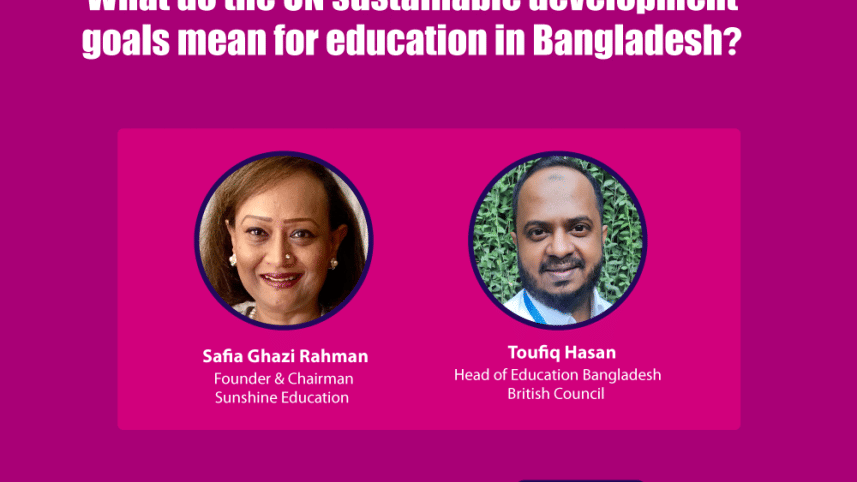Quality education towards ensuring equality and inclusion

In 2015, the General Assembly of the United Nations adopted the 2030 Agenda for Sustainable Development. It includes 17 sustainable development goals that focus on sustainability and development taking a holistic view. Among these goals, goal number 4 ensures inclusive and equitable quality education by promoting learning opportunities for everyone. To discuss this important issue, the Daily Star with the collaboration of the British Council aired a session titled 'What do the UN sustainable development goals mean for education in Bangladesh?' on 15 November 2022. It was a part of their live webinar series hosted by Wendy Naylor, Consultant at The British Council.
In the discussion, Wendy briefed the seven steps of this goal, stating that Bangladesh has already made significant progress in increasing the number of children in primary school. However, this increase means there is still a lot of work to be done to ensure the quality of education. According to the indicators of the UN Sustainable Development Goals, Bangladesh should scrutinise whether students are completing primary and secondary schools. The indicators also require us to examine whether reading and mathematics sufficiently reflect academic prowess, and how inclusiveness in gender among students could be better maintained.
"The agenda for sustainable development goals is a powerful framework and a global commitment of countries all around the world", said Toufiq Hasan, Head of Education Bangladesh at The British Council. During the discussion, Toufiq stated that the main challenge that remains involves focusing on quality over quantity, as he said that according to the statistics, the number of students and gender parity has improved dramatically in primary schools.
Toufiq also added that the Primary Education Development Project (PEDP) is now more about new curriculum and assessment, in-service training for teachers, a certificate in education, and deployment education to ensure quality education at the primary level. There are also some large reform projects at secondary and tertiary levels, and some credit goes to the framework of SDGs for reshaping these government projects.
On the contrary, Sunshine Education's Founder and Chairman Safia Ghazi Rahman believes that there are many factors still remaining to ensure quality education. Providing only textbook education in schools will not be effective if students are in a dire situation. She said, "There are many schools in remote areas where students come to school barefoot, and they have hardly anything to wear. They need food, clothes, and medical facilities as well so that they can concentrate on studying."
According to Safia, Sunshine Education provides these much-needed commodities to students in need. They also offer Bangla and English medium education free of cost so young students can study without worrying about fees. She also mentioned that if social and financial barriers are eliminated and people from the private sector actively participate with the government, the ultimate goal of quality education can be achieved.
Adding to Safia, Wendy stated that besides the government and institutional organisations, local entrepreneurs also play a vital role in offering public education. She said, "I think there is a powerful link among sustainable development goals. For instance, the first three goals: no poverty, zero hunger, and good health and well-being, are the cornerstones for people to flourish and feel secure, so they can later engage with education." Wendy believes that educators from across the spectrum need to support students to overcome such problems to increase participation in classrooms.
Both speakers mentioned that due to the aftermath of the Covid-19 pandemic, there have been many notable changes in human behaviour. The unprecedented challenges have caused educational gaps that have yet to be fully resolved. Using only government initiatives will not ensure quality education, the SDGs also need to provide a road map for collaboration. The discussion outlined that all actors in the education field need to work together to pave the path of better education for Bangladeshis everywhere.
 For all latest news, follow The Daily Star's Google News channel.
For all latest news, follow The Daily Star's Google News channel.
Comments